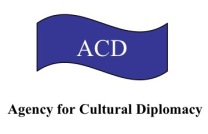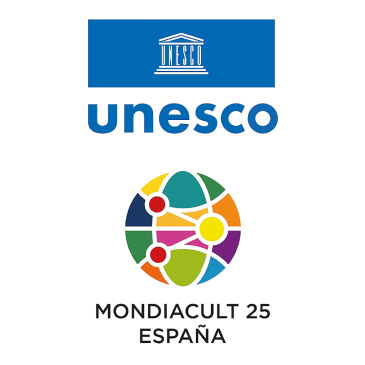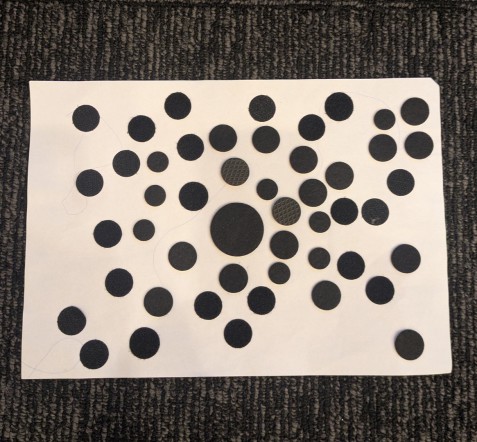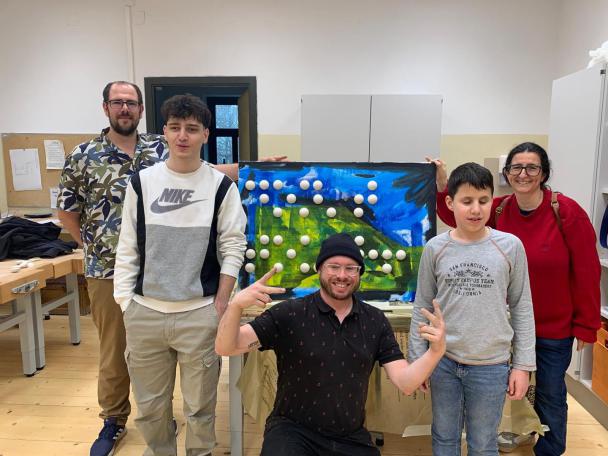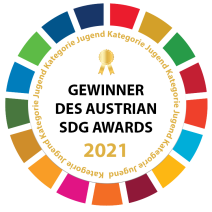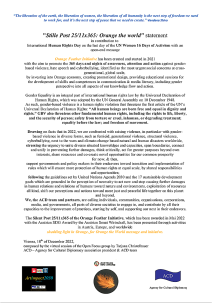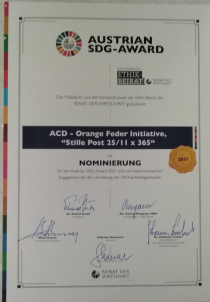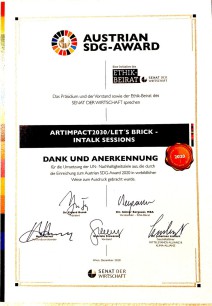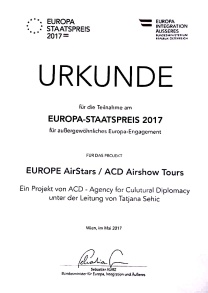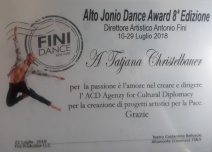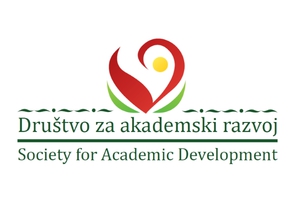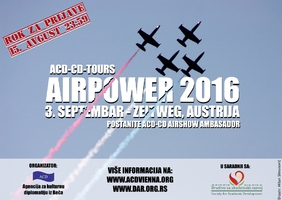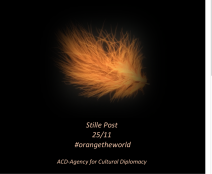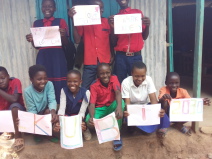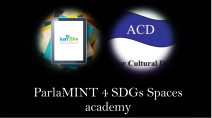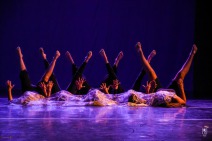
inSight Meeting dots4futures Manifest
open space for contributions
PDF-Dokument [1.9 MB]
PDF-Dokument [540.2 KB]
inSight Meeting Manifest – Dots4Futures Sunshower2030 ...
In contribution to the
UNESCO MONDIACULT World Conference on Cultural Policy 2025
We, the participants in the inSight Meeting – Dots4Futures25, convened on the occasion of World Health Day 2025 in Vienna, representing diverse sectors of the creative economy, health, media, and cultural policy, committed to advancing inclusive and equitable societies, hereby:
Recognizing Culture as a Pillar for Sustainable Development
· Acknowledge the transformative role of arts, culture, and media in fostering inclusion, well-being, peace, and prosperity, particularly for blind and disabled individuals, ensuring their full participation in cultural and social life while broadening career opportunities within the creative industries,
· Reaffirm that cultural rights must be guaranteed for all—and upheld by all. This requires ensuring accessibility, inclusion, and equitable representation in cultural policymaking at all levels.
· Stress that cultural diversity and cultural democracy are essential ethical components when considering culture as a stand-alone goal in the post-2030 Sustainable Development Agenda. While such recognition highlights the ethical frameworks for different cultures, it must not come at the cost of overlooking their diverse forms and heritage.
Commitment to Inclusive Cultural Policies
· Advocate for an inclusive approach that embraces diverse cultural expressions and amplifies underrepresented perspectives, particularly those of blind individuals, who contribute to cultural and artistic narratives through sensational awareness—“by the inner eye”—shaping the judgment of taste through unseen yet profound impacts on well-being and collective cultural identity.
· Call upon UNESCO, the UN, national governments, and policymakers to prioritize cultural democracy by ensuring diverse and equitable participation in cultural and educational opportunities. Investing in cultural accessibility unlocks social and economic benefits while fostering innovation and cross-cultural dialogue.
· Propose the establishment of international frameworks to integrate inclusive innovation in arts, media, and policy to combat social isolation and promote well-being, reinforcing the role of culture as a fundamental pillar of sustainable development.
Cultural Rights as a Foundation for Equity and Progress
Understanding and Practicing Culture Through the Prism of Sustainability
Culture is not a static entity but a living force that evolves within the framework of sustainability. It is both a source of identity and a dynamic contributor to the well-being of individuals and societies. To ensure culture remains a driver of sustainable development, we must embrace policies that promote environmental responsibility, social equity, and economic viability within cultural practices.
By integrating culture into sustainability efforts, we reinforce its power to foster resilience, preserve heritage, and inspire innovative solutions to global challenges. Culture must not only be preserved but continuously reimagined in ways that sustain communities, nurture inclusivity, and uphold human rights for generations to come.
Cultural Diplomacy for Sustainable Development
Civil society organizations (CSOs) play a crucial role in advancing cultural diplomacy as an essential component for sustainable development. By fostering international dialogue, cross-cultural exchange, and inclusive policymaking, CSOs bridge gaps between diverse communities, ensuring that cultural rights remain at the forefront of global discussions.
Furthermore, the active engagement of blind individuals in diplomacy and international relations offers a unique and necessary perspective in shaping policies that reflect the full spectrum of human experience. Their insights challenge traditional norms, reinforcing the idea that policymaking must be informed by diverse lived experiences. Acting now, with and within, we enable a future where diplomacy sharpens its vision not only through external observation but through the profound inner eye—where unseen impacts of culture contribute to well-being, peace, and prosperity for all.
United in our vision of a more just, inclusive, and equitable world, we declare that:
· Cultural rights are human rights. They must be protected, promoted, and integrated across all policies to ensure that everyone can actively participate in shaping cultural narratives and policies regardless of ability.
· Culture is the mirror of society. If certain voices are missing, society remains incomplete. Blind individuals bring invaluable perspectives that must be recognized, supported, and reflected in global cultural policies.
· Diplomacy and policymaking must be inclusive. Leaders with disabilities should actively shape international cultural policies, ensuring representation that moves beyond tokenism to meaningful participation.
A Call to Action
We do not seek permission to participate—we claim our rightful space.
We urge UNESCO, the UN, national governments, and cultural and economic institutions to:
· Ensure cultural democracy by integrating accessibility across health, economic, and cultural sectors, guaranteeing equal opportunities for disabled individuals in education, employment, and leadership roles.
· Establish pathways for disabled youth in diplomacy, cultural policy, and creative industries, positioning them as architects of change rather than passive beneficiaries.
· Invest in accessible technologies, inclusive artistic platforms, and cultural programs that combat isolation, empower marginalized communities, and foster creative entrepreneurship.
· Recognize cultural diversity as an engine for sustainable development, ensuring that economic empowerment through culture leads to dignity, influence, and the ability to shape individual and collective narratives.
Let us build a future where the shared vision—seen or unseen
—has the power to shape the world.
Composed by Tatjana Christelbauer/AT- ACD-Agency for Cultural Diplomacy President, insight meeting initiator and organizer,
and agreed by inSight meeting well-acts dots4futures25 team members:
1. Emilie Conway/IR artist, Art therapist, human rights activist, Disable Artists Disable Academics movement initiator (D.A.D.A)
2. Dr. Luka Martin Tomažič /SLO Alma Mater Europaea Univ.Maribor
3. Isabella Essl/AT Essl Foundation, Zero Project Inclusive Arts
4. The BLIND, artist/FR
5. Tatania Fischer/AT: ÖBV, Braille House Vienna
6. Mark Klenk “words&deeds”, founder of the NGO “Words and Deeds", the Chairman of Writers at Risk Austria (PEN Club Austria)
7. Tatjana Christelbauer/AT: ACD-Agency for Cultural Diplomacy President, insight meeting initiator and organizer
Supported by
Amb. Dir Emil Brix
H.E. Ambassador Barbara Cullinane, Ireland's Ambassador to Austria
UNESCO Austria
Place for additional individual statements, please add your own, together with your name, Organisation you represent, country, media page & contact (optional)
“Zero Project Inclusive Arts is dedicated to the transformative power of Arts and Culture, by finding and sharing innovative solutions that remove barriers for persons with disabilities in alignment with the CRPD. The Zero Project believes that exposure to and participation in the Arts can strengthen communities, drive economic growth, enhance education, and improve health and wellbeing.”
Isabella Essl
Essl Foundation, Zero Project Inclusive Arts
“I am passionate that as a society we learn and take the steps to facilitate people who have a disability to express and develop their abilities and reach their potential. I see it as a question of creativity: creative inquiry, creative response, and creative practice. There is so much we can do to disable the disabling aspects of disability. People with disabilities are frequently inherently more creative anyway; they’ve had to learn to be able to live in a very “able” world.
To play my part, this page will bring you through specific projects I have created, am involved in, or am an advocate for.“
Emilie Conway
celebrated jazz singer, dancer, performer, psychotherapist, and human rights activist/Dublin, Ireland
"The call for inclusive cultural policies and the recognition of cultural rights as important human rights resonates with broader global movements for peace and cooperation. In this spirit, the inSight Manifest – Dots4Futures25 aligns with initiatives such as the Global Peace Offensive by WAAS, working together to advance dialogue, human rights, and sustainable peace through culture and respect for human dignity."
Dr. Luka Martin Tomažič
Alma Mater Europaea University Ljubljana, member of the dots4futures insight meetings team
"At Visual Eyes Afrika–international, we affirm that vision rehabilitation and habilitation studies are central to human dignity and inclusion.
Rehabilitation restores capacities and independence for those who have experienced sight loss, while habilitation enables individuals, especially those born with visual impairment, to develop new skills and participate fully in society.
We believe that vision is more than a biological function: it is a cultural and social resource. To see is to belong, to create, and to share in the life of communities. Our mission, therefore, embraces not only clinical practice but also education, advocacy, and intercultural dialogue.
In alignment with the Agency for Cultural Diplomacy’s inSight meeting, we uphold the principle of open space: a commitment to dialogue, creativity, and cooperation across borders.
Just as cultural diplomacy builds bridges between nations, our work at Visual Eyes Afrika-international builds bridges between disciplines, practices,s and lived experience, ensuring that visual health and cultural participation are recognised as universal rights.
This is our pledge: to champion both rehabilitation and habilitation as pathways to empowerment, cultural vitality, and global understanding."
Molemisi Cono
Founder and CEO of Visual Eyes Afrika-international
inSight
Youth Manifest – Dots4Futures25
For the UNESCO MONDIACULT World Conference on Cultural Policy 2025
A Call from Young People to the World – Led by Blind and Visually Impaired Changemakers
Introduction:
Inclusion and Diversity in the Framework of European Youth Policy, The European Youth Strategy 2019–2027 highlights the importance of inclusive societies and calls for the active participation of all young people, regardless of their individual circumstances. One of the key objectives is to ensure equal opportunities for young people with disabilities.
Yet, despite this framework, barriers in
education, employment, and political participation remain – especially for blind and partially sighted youth. Inclusive access alone is not enough: a shift in cultural and structural thinking is
needed.
This is where the inSight Manifest – Dots4Futures25 comes in. Created by blind and visually impaired changemakers, this call to action emphasizes that inclusion must be shaped through the lens of
diversity, and must be connected with economic empowerment, cultural representation, and policy participation.
Austria – Opportunities and Challenges
Austria has made important efforts to integrate disability rights and youth inclusion into national strategies:
• “Inklusiv.JA” Focus 2024/25 in Vienna’s Youth Work:
The City of Vienna has introduced a two-year focus on inclusion
in open youth work. Its aim is to break down
barriers and promote the active participation of young people with disabilities, including blind and partially sighted youth.
(Source: behindertenrat.at)
• Austrian Youth Strategy:
Austria’s official youth policy integrates the European Youth
Goals, including “inclusive societies.”
However, implementation varies between regions and sectors.
(Source: bundeskanzleramt.gv.at)
However, despite these positive developments, the reality on the ground reveals structural obstacles:
• Loss of financial assistance upon employment:
In many cases, once blind or disabled individuals start working,
they lose essential financial support or even face higher taxes. This discourages economic independence and entrepreneurship.
• Limited access to political processes:
There is still too few opportunities for young people with disabilities to participate in diplomacy, cultural policymaking, or leadership roles.
(Source: bjv.at1)
Empowerment Fund – A Forward-Looking Solution
The inSight Manifest proposes a dedicated Empowerment Fund that provides:
°Financial support during education, internships, and transition to employment, especially in policy and diplomacy Assistance for blind entrepreneurs to develop businesses that serve and employ blind and visually impaired people
° Incentives for cross-sector collaboration in innovation, accessibility, and inclusive growth.
This fund may be designed not just to close gaps, but to establish leadership and creativity coming directly from within the blind community – turning ideas into sustainable impact.
Why We Are Here
We have gathered in Vienna – young voices from
art, health, media, and cultural activism – to make it clear:
Inclusion is not a favor. It is a foundation.
Blind and visually impaired youth and adults are not here to be “integrated” – we are here to lead, shape, and change.
1 Weblink: https://bjv.at/behindertenrechte-staatenpruefung/
Dots4Futures – Where Visionaries Connect
Dots4Futures is more than just a
project.
It is a meeting point – a space where blind, visually impaired, and sighted people come together to:
• Break down barriers
• Fight loneliness and
exclusion
°Create jobs and start businesses
°Empower each other – blind for blind, with sighted allies by our side
• Become buddies in entrepreneurship and innovation – for a sustainable future
We don’t just build connections –
we build communal spaces for empowerment. ^
Culture That Reflects Us All
Culture is a right, a mirror, and a force for
change – but only when all perspectives are visible.
Blind and visually impaired people are often forgotten – they experience more social exclusion and have fewer opportunities to participate.
Inclusion is not just about consuming adapted content.
It’s about creating, interpreting, presenting, and leading.
We want:
°Our artworks and perspectives to be recognized, our expressions and feelings to be heard
°Stages where we can showcase our work, ideas, and perspectives
Diversity Within Inclusion – A Must, Not a Choice
Inclusion must be seen through the lens of
diversity. Too often, under the “banner” of inclusion, blind individuals are not at the forefront. We are calling for a shift.
Blind people face specific challenges and must be supported in ways that reflect those realities – especially in fields like diplomacy, cultural policy, and the creative industries. These spaces must
be made truly accessible – through targeted educational pathways, inclusive structures, and economic support.
Innovation is only possible when diverse
perspectives and abilities are united and integrated – in visions, ambitions, and actions. Inclusion, yes – but with a deeper understanding that diversity within disability is key.
Understanding both inclusion and culture through the prism of diversity opens up wider perspectives and real opportunity.
When we co-create opportunities with this mindset, we lay the groundwork for meaningful cultural participation and sustainable development for all.
Diversity Within Disability Must Be Seen
We come from different cultures, speak
different languages, have different talents, dreams, and forms of expression.
Our experiences are not the same – and it is precisely in this diversity that our creative strength lies.
Cultural diversity and intercultural dialogue must be a part of every inclusive effort – especially with blind and visually impaired people. Inclusion cannot just be understood as a right to access,
but must also take into account the diversity within the disability community.
Inclusion + Economic Power = Real Change
Access is the beginning – but economic participation is the goal.
We demand from political decision-makers and
international organizations:
Career pathways for blind and visually impaired youth in art, media, education, cultural policy, and entrepreneurship. Investments in inclusive entrepreneurship – especially in community-driven
projects
Recognition of culture not only as a human right but also as an economic pillar of sustainability
Programs that make creativity not just a hobby but a vocation and profession
Proposal for an Empowerment Fund
We propose the creation of a dedicated Fund
for Economic Empowerment aimed at providing blind and partially sighted individuals with access to education, internships, and job opportunities in policymaking and diplomacy.
This fund will also support entrepreneurship, enabling individuals to supply goods and services that support the blind and partially sighted community directly.
Such a fund will foster economic independence, encourage leadership, and stimulate innovation from within.
Dots4Futures is a space where ideas turn into actions and passion becomes a profession.
Our Role in the Future
We do not want symbolic seats – we want to co-shape policy, engage in diplomacy, and influence cultural narratives. Representation is important – but meaningful participation is crucial.
What We Believe
Culture is a tool for justice and
inclusion
Blind and visually impaired creatives are leaders
Collective strength – blind for the blind, supported by sighted allies.
An inclusive economy where cultural work leads to dignity, sustainability, and independence
Our Declaration
Cultural rights are human rights – inviolable
and for all. Inclusion must make visible different abilities, cultures, and dreams. Blind and visually impaired youth and adults deserve equal opportunities to learn, work, create, and lead.
Culture is not complete when voices are missing. And we will no longer be overlooked.
Our Inner Vision Shows the Way
Sight is more than a sense. It is
imagination, feeling, experience, and courage.
Let us create a world together where every type of vision counts – seen or unseen.
Together, we shape a future where shared vision can change the world.
Participants in the insight meeting well_acts dots4futures25 in collaboration with teachers and students at the Vienna Institute for Blind BBI
8th of April 2025
Tatjana Christelbauer, President ACD-Agency for Cultural Diplomacy Blütengasse 11-13/9
1030 Wien
Organizer, Initiator
https://www.acdvienna.org/aktuell/insight-soft-power-activism-arts4hr/insight- meeting-workshops-at-bbi-vienna/
dots4futures Panel: https://www.acdvienna.org/aktuell/unesco-mondicult-2025-dots4futures/
